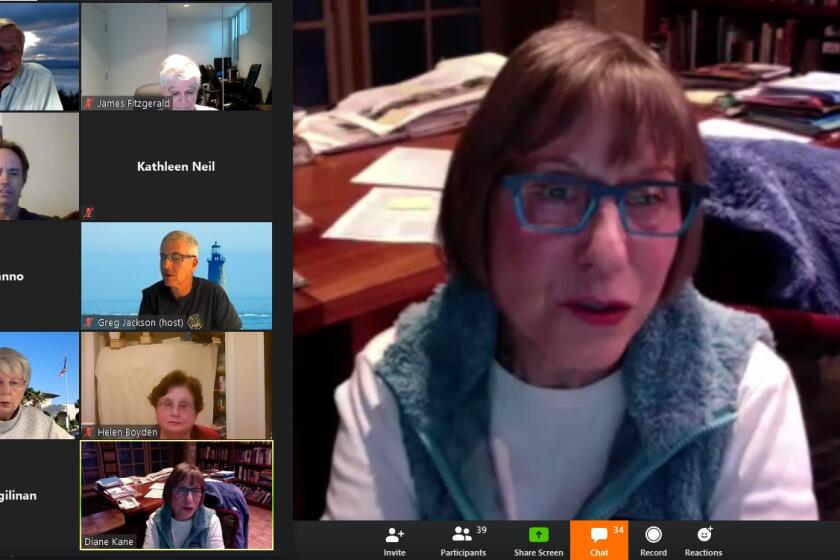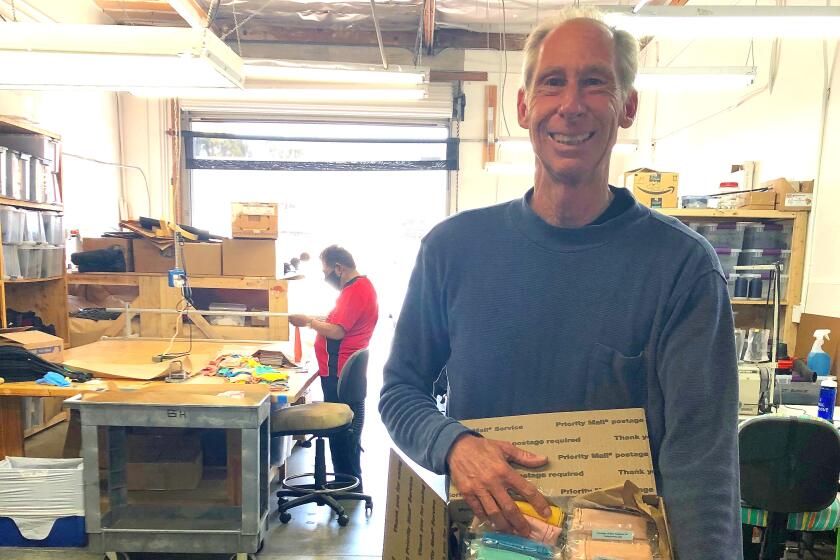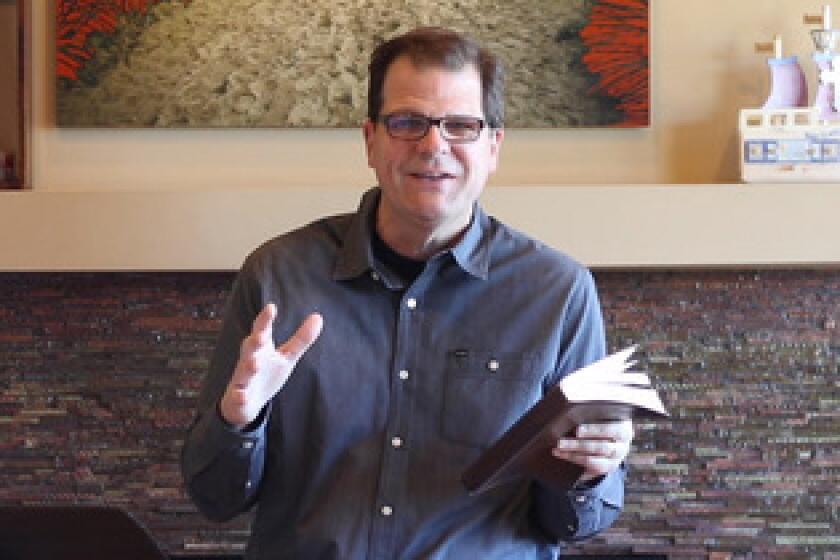BIKE-AGEDDON! La Jolla meetings put dockless companies in bicycle hot seat
Last week, two La Jolla community groups heard from the companies behind the dockless bikes and scooters that many citizens complain are blocking their public right-of-ways, doing business without paying taxes and endangering the lives of users and pedestrians by permitting customers to ride them drunk and/or without helmets. A third advisory board discussed the bicycles without a formal presentation, calling for an outright ban.
It was the first chance that most had to address the human beings actually behind the machines that have become a growing fixture on La Jolla’s sidewalks since February.
At the La Jolla Village Merchants Association (LJVMA) meeting, April 11 at the Riford Library, grievances were tossed out with such frequency and frustration from the board, and members of the public, that reps of LimeBike, ofo and Mobike barely got a chance to respond. It was more like, as outgoing LJVMA president James Niebling joked, “a firing squad” than a forum.
Who’s liable?
Of primary concern was liability for any injuries and deaths caused in the public right-of-way by dockless bikes in La Jolla. “We have the public right-of-way,” LJVMA executive director Sheila Fortune declared, “the Merchants Association and me particularly. My name’s on the document, so I’m responsible for anything in the public right-of way.”

Referring to a dockless bike left on a handicap access pathway, San Diego Fly Rides bike store owner Ike Fazzio asked: “What’s to prevent someone getting into an accident with that bike and not only possibly bring up a lawsuit with you guys but with the City of San Diego?”
LJVMA treasurer Brett Murphy added: “The potential litigation is through the roof.”
Fazzio, whose store rents electric bikes (e-bikes), specifically took LimeBike’s Khoa Nguyen to task because the majority of its users also seem to do so without helmets. “In the State of California, you have to wear a helmet to ride an electric bike,” Fazzio said. “That is a legal mandate.”
Nguyen replied: “I don’t know if the electric bikes, specifically, have a requirement for wearing a helmet.”
Fazzio shot back: “Do you know the classifications for e-bikes in California? That might be something you want to look into!” (Nguyen was then handed a copy of the laws and regulations covering e-bikes by San Diego Park & Recreation Department member Bill Robbins.)
Neither Winkler nor Nguyen are San Diego residents, nor did they demonstrate a knowledge of City, or even State, law. They were clearly charged with launching their products in multiple markets across the United States.
Nguyen thanked Fazzio for “the learning situation” and added: “It would be good to sit down with you and have you teach me a few things.”
At this point, the room exploded into incredulous shouting. Fazzio, the loudest shouter, declared: “Your business is backed by hundreds of millions of dollars and I’m surprised you don’t know anything about Class 1, 2 or 3!”

Masterful prosecutor
Robbins went off on the dockless reps like a well-prepped prosecutor, flooring jaws across the room.
“Apparently, you guys have already come up with some rules because you deployed them at San Diego State yesterday,” he told ofo’s Stefan Winkler, “and I don’t think they let you on the campus without a whole long list of rules.” (Craig Benedetto, a paid advocate for ofo who is from San Diego, confirmed Robbins’ information, explaining that it “was an agreement with San Diego State.”)
“Well, that might be a model,” Robbins said. “You didn’t go there until you got the rules worked out. Here, you just came with no rules. You’re at San Diego State now, where I bet there are some rules about counting them and picking them up, right?” (Benedetto confirmed Robbins’ information again.)
Robbins added that he’s certain LimeBike had rules when it launched in Imperial Beach and National City. “But you came to San Diego without rules,” he said.
Robbins concluded: “You guys are kind of trying to pull a fast one on us. Some places you go and make a contract before you go in and work out rules. So contracts are out there. I want to get it in the news media here that you’re meeting with the police department, because buddy, you’re breaking lots of rules with your electric bikes and scooters — no helmets, people driving while intoxicated, underage, on the sidewalks.”
Not La Jolla deployers?
All reps denied deploying their services in La Jolla, insisting they don’t drop off bikes or scooters here. Their customers ride them from other places, they argued, and they do their best to pick up the vehicles that aren’t re-ridden and redistribute them to where they’re used more.
La Jolla resident Sally Miller took issue with this claim, which proved to be the snapping point for Nguyen.
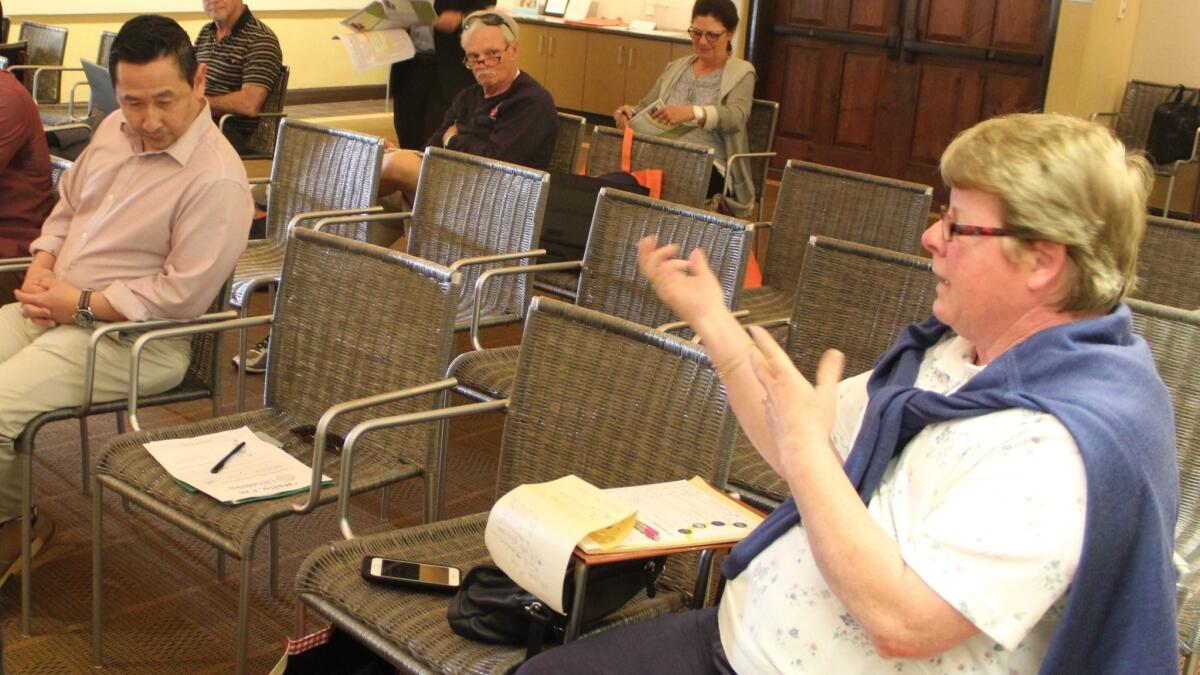
“Because of the amount of bicycles we see around town,” Miller said, “it’s really hard for me to believe that you did not help dump them here.”
“Why do you keep saying that?!” Nguyen raised his voice at Miller, cutting off her rebuttal. “We do not just put two bikes in one deployment. It does not make any sense! If we’re going to deploy a bike in the area, we put 15 bikes there, so it makes sense for multiple people to come and ride them. If there’s two bikes, it doesn’t make any sense!”
Miller also asked why the dockless companies “don’t get your bikes out of here faster?” Winkler replied that “if there’s a bike in an area where you don’t want it … please contact us through e-mail,” to which Murphy loudly rebutted: “That’s not our responsibility.”
Fortune took Mobike’s Keven Duran, who arrived 50 minutes late to the meeting, to task for a bike she said was left on her streetcorner for a week — as opposed to the 24-hour timeframe Duran had just finished citing. “This is your bike, right?” Fortune asked, holding up a camera phone photo. “It says Mobike and it’s orange and grey.” (Duran thanked Fortune for bringing the problem up and apologized to her.)
Taxing question
Another issue was the sales tax skirted by the dockless-bike business model. Winkler stated that ofo has a business license in San Diego, “so I assume we are paying taxes.”
Fortune explained, on behalf of all the companies: “They have (a license) for the City but not for the BIDs (business improvement districts) and not for each individual community.”
“That’s a business tax,” Robbins added, addressing his next question to all three companies: “Do you collect California sales tax?” (The answer eventually revealed itself to be no, because sales tax is not collected on services in the City.)
Fazzio argued that dockless bike companies are getting a “very free ride” by not paying the same share of their income that his store is, which could be used to provide cycling infrastructure to the City.
“You’re throwing a bunch of stuff at us that we’re going to have to figure out how to pay for, and we don’t want to pay for it,” Robbins added. “You’re the ones making the money, not us. A regular bike shop’s already paying.”
Murphy, who eventually brought order to the proceedings, asked all the reps what information about their business they were asked to supply when applying for that business license, and whether it would have been better to iron out the issues brought up at the meeting before their vehicles hit the streets — since they probably knew, based on operating in other cities — what the issues were likely to be.
Nguyen replied that LimeBike filed a preliminary review permit application with the Development Services Department (DSD) that was reviewed by its director, Bob Vacchi, who determined that the public right-of-way couldn’t be regulated the same way that it is for Segues, for example, and that a business license was all that was required.
“And then they went to the City Attorney’s office,” Fortune cut Nguyen off, “and the City Attorney’s office said, ‘Well, I don’t see any reason why you can’t do this.’ Well, the City Attorney (Mara Elliott) and DSD did not talk to Economic Development, did not talk to any other department, did not talk to any of the City’s 17 BIDs, and we all found out at the last minute.”

The real culprit
The root of the problem was eventually identified by Benedetto: the exclusive marketing agreement that DecoBike (now Discover Bike) has with the City of San Diego, which it signed in 2013 and which runs until 2023.
“That’s central to this point,” Benedetto said, “because that exclusive agreement basically allows them to declare they are the official bike of San Diego. But it also prevents the City and the Council, according to the City Attorney’s opinion, from doing things that might help a competitor. They can’t prevent them — that was her opinion — from coming to this market, but they can’t help them. And that even seemed to apply to the Council getting into regulating them, and that’s part of the discussion right now.”
In other words, don’t blame the dockless-bike companies for taking advantage of a veritably regulation-free situation; blame the City for creating it.
Town Council less combative
La Jolla Town Council’s (LJTC) special dockless-bike panel, the following night at the Rec Center, brought up most of the same issues and brought back two of the same reps as panelists. But LJTC president Ann Kerr Bache, who moderated, constantly kept the debate on point.
“We’re not going to focus on the problems as much as how do we develop a solution together, and we don’t expect to have a solution tonight,” she said beforehand.
Nguyen and Winkler were once again on hand to present their business models and deflect criticism. Duran was not. Instead, this panel was joined by Bird rep Cameron Gore — which seemed appropriate since, during an opening slideshow, retired lifeguard chief Chris Brewster explained why San Diego’s dockless scooter problem is different in nature, and worse, than its dockless bike problem.
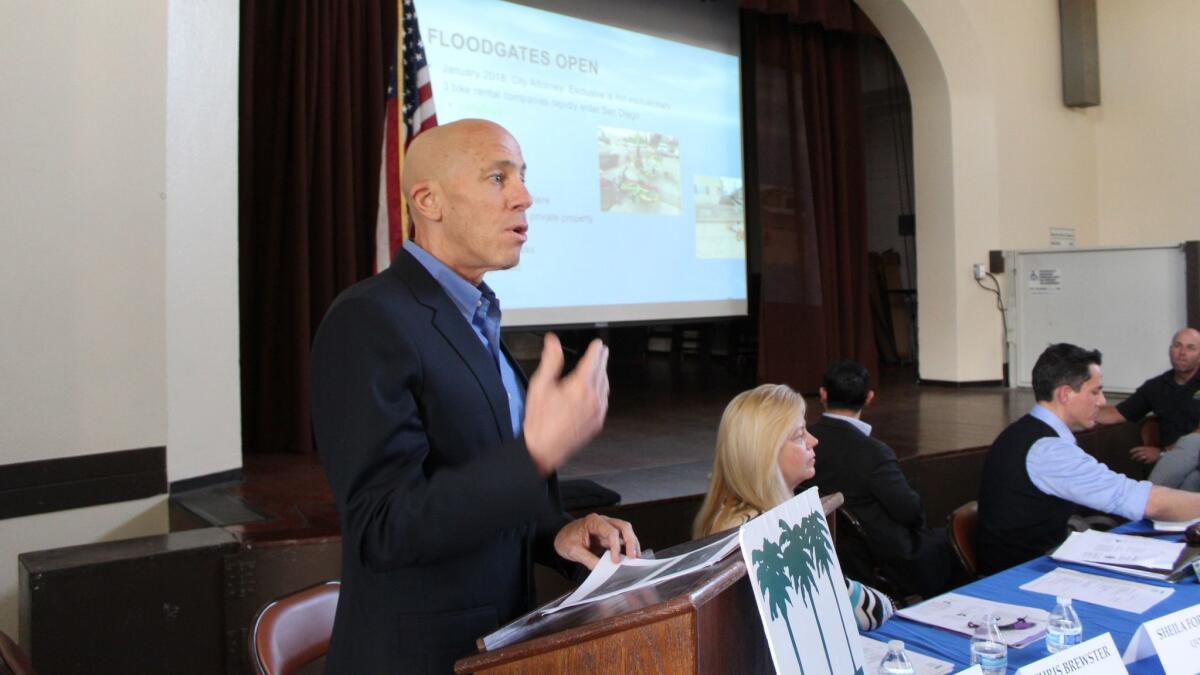
“The average person is not out there walking around with a helmet, thinking, ‘Well, maybe I’m going to get on a scooter soon,’ ” Brewster explained, spelling out what everyone at the meeting already knew: that scooters are “almost always being used unlawfully.” (Brewster estimated that only 1 in 100 scooter riders wore helmets.)
Brewster said he e-mailed San Diego Police Department Northern Division Captain Tina Williams about the problem, who said that on March 26, the Traffic Division went to Pacific Beach and wrote 100 citations to scooter riders. (“I think it took 10 or 15 minutes to get those done,” Brewster joked.)
According to Brewster, Williams did not mention whether beat officers are expected to enforce those laws as they would with motorcycles. “And she said, interestingly enough, that the SDPD is currently evaluating the legality of operation on the boardwalk — which is interesting to me, because it has been unlawful for probably 40 or 50 years to operate a motorized vehicle on the Pacific Beach/Mission Beach boardwalk and, for that matter, any walkways in the parks.”
Brewster concluded his presentation with a photo of an SDPD officer riding a dockless scooter without a helmet. “I just want to point out how helpful the police are in San Diego,” he said to chuckles from the audience, explaining that he snapped the photo when some tourists asked the officer to demonstrate how the app worked.
For the Birds
During her presentation, Gore touted the helmets that Bird distributes free within its app, explaining that “if you use Bird, then we are sending free helmets if you request one.” (Actually, as one Town Council member corrected her, they cost $1 to ship.)
Gore also stated that Bird does “constant helmet giveaways,” but when asked where users can go to get them, she replied: “It really just depends on each city.” When asked where in Pacific Beach users can go, she replied: “I’m actually hiring a community manager who’s going to be doing that in Pacific Beach very soon. It just depends on the location and where we can get a spot.”
Bache pointed out that none of this addresses Brewster’s allegations of rampant helmet violations, to which Gore didn’t have an answer. (When asked by a member of the audience why helmets couldn’t be attached to each scooter, Gore cited “hygienic reasons,” a reference to lice that dozens in the audience shook their heads about immediately.)

La Jolla Neighborhood Watch coordinator Cynthia Chasan asked Gore whether there was some way for Bird to fine scofflaw scooter users, in the act, instead of police.
“Any enforcement they do on these bikes and scooters is taking away important resources that need to be allocated to more important matters,” Chasan said. “I know you guys are all big on educating the users on the rules, but that’s not going to work. These users are very inconsiderate. They don’t care about the rules. No matter how much you educate them, they’re still going to break the law.”
Gore replied that it is very difficult to track abusers “unless someone provides us with an ID of the Bird immediately after it’s been placed, because another rider is going to pick it up eventually.” She added: “If we are notified, in the moment, that something is happening, then we absolutely can track it. We can talk to that rider specifically, and we do that very often — especially if they are not being very safe about how they’re riding or if they have dropped it in a wrong location.”
Gore then seemed to contradict herself, stating that “in the app, currently, that’s not available for us to have real-time feedback” and that “we are working on that.”
Solutions worth it
Despite the many acknowledged problems with dockless bikes and scooters as they exist today in San Diego, and the lack of satisfactory answers provided by vendors at these two community meetings, bike-sharing does seem to be on the correct side of history. Providing the bigger picture most effectively was Andy Hanshaw, executive director of the San Diego Bike Coalition. Hanshaw reminded the Town Council audience that every rental of one of these green machines is a car ride that is likely not to happen, which eases San Diego’s struggles with traffic, parking and pollution.

“Now, all of a sudden, we’re giving people the affordability, the accessibility, to have a means to get around without getting in their car,” Hanshaw said, calling it “a pretty good thing.”
“We’ve got a downtown mobility plan that’s going to put a nine-mile, protected bike lane network in downtown,” Handshaw said. “Why? Because 90,000 people are going to live there in 15 years, as opposed to 30,000 now, and you can’t just expect more people to drive to get where they want to go.”
And not only are dockless bike rentals increasing ridership of dockless bikes, Hanshaw said “there’s an influence here ... I’m also seeing people riding more of their own bikes.”
Motion passed
Town Council unanimously voted to pass a rather lengthy motion, typed up before the meeting, which asks the City to “implement reasonable and balanced regulatory and infrastructure solutions” to the dockless bike and scooter problem.
“It’s so wishy-washy,” Bache joked, “even Washington would approve.”
La Jolla Shores motion
The La Jolla Shores Association, the community with two bicycle rental businesses on its main thoroughfare, suggested an outright ban on the dockless bikes — and voted to send a letter to the mayor’s office requesting immediate action during its April 11 meeting.
The board originally took up dockless bikes during its March meeting, and expressed concerns about bikes being parked on sidewalks, in hedges and in front of other tax- and rent-paying businesses, and riders violating the laws by not wearing helmets and riding on sidewalks.
Sharon Luscomb, owner of Hike Bike Kayak, questioned why Code Compliance does not hold these companies to the same standards as other recreation concessionaires.“I do bike tours and we have to have insurance, we have to have space, we cannot leave them outside in the right of way or in an easement, we pay city permit fees and we cant use the street as storage, and these bikes are using the street as storage,” she said. “We get tickets if we leave a wetsuit in the public right of way, these bikes should be cited.”
In addition to Hike Bike Kayak, La Jolla Shores is home to Bike and Kayak Tours La Jolla.
At the April meeting, the board voted to send a letter to the mayor asking for these companies to be put the companies on notice that they are not welcome in La Jolla Shores. It outlines the concerns regarding congestion on the sidewalks that are frequented by beach-goers with equipment.
LJSA chair Janie Emerson said the board sought a ban because it was seemingly successful in preventing DecoBike/Discover Bike kiosks from coming to The Shores. The City’s plan was originally to bring kiosks to areas up and down the coast, but has since shifted its priorities to San Diego’s “urban core.”
— Ashley Mackin-Solomon contributed to this report.
Get the La Jolla Light weekly in your inbox
News, features and sports about La Jolla, every Thursday for free
You may occasionally receive promotional content from the La Jolla Light.

